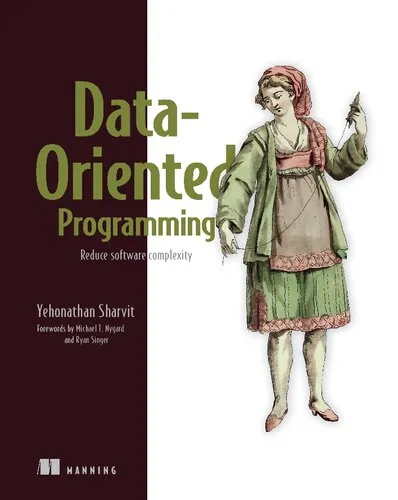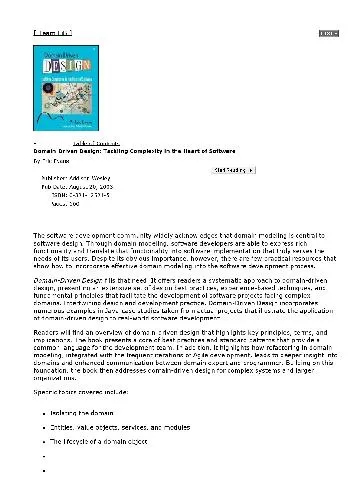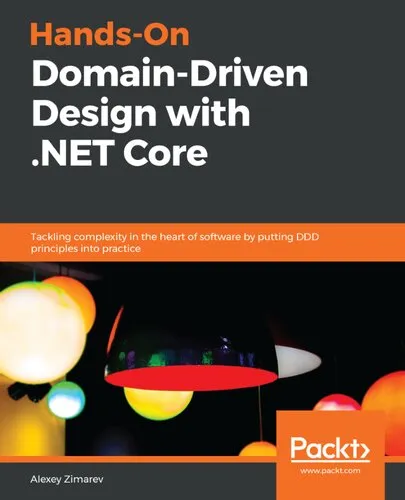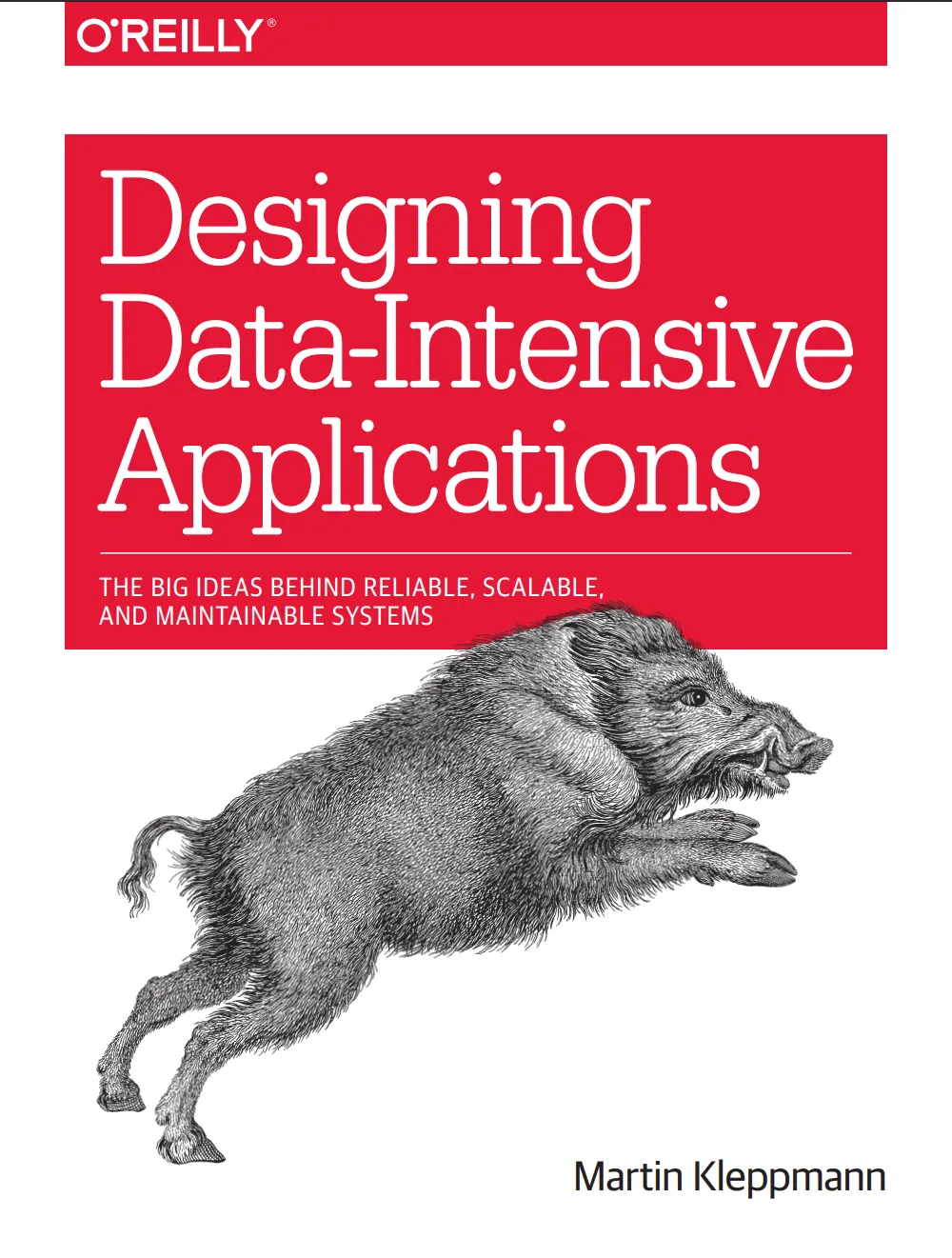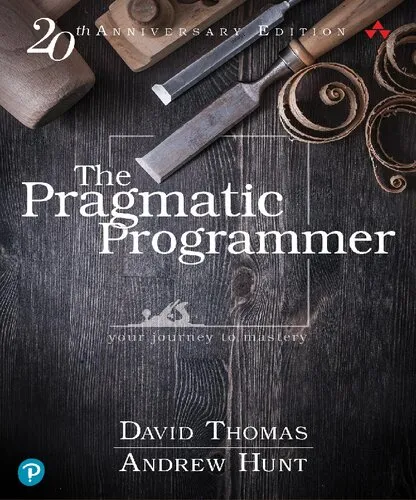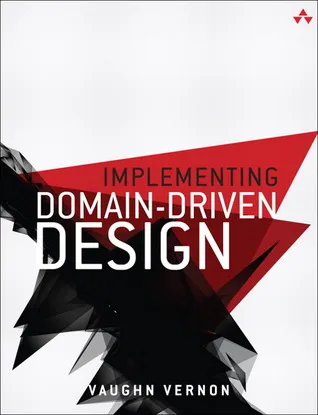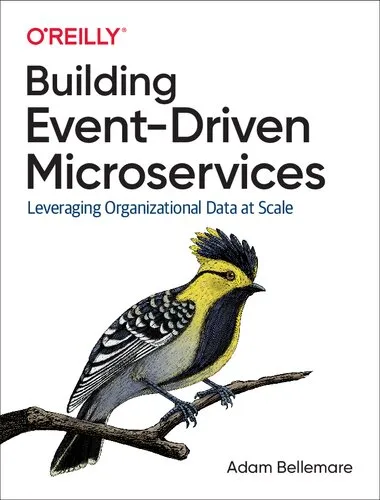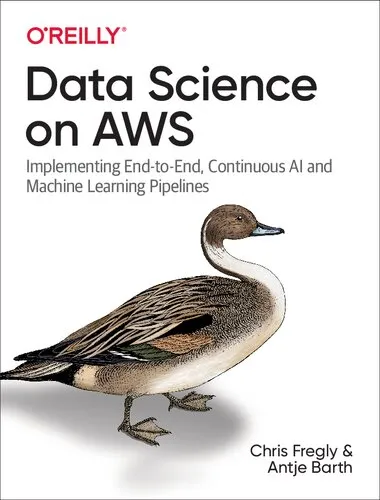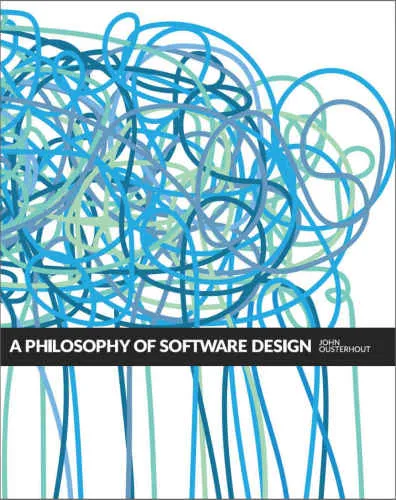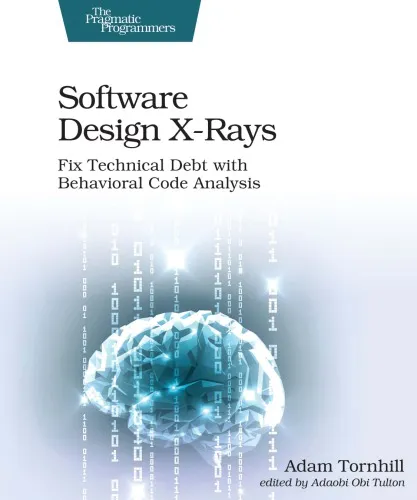Data-Oriented Programming: Reduce complexity by rethinking data
4.5
بر اساس نظر کاربران

شما میتونید سوالاتتون در باره کتاب رو از هوش مصنوعیش بعد از ورود بپرسید
هر دانلود یا پرسش از هوش مصنوعی 2 امتیاز لازم دارد، برای بدست آوردن امتیاز رایگان، به صفحه ی راهنمای امتیازات سر بزنید و یک سری کار ارزشمند انجام بدینکتاب های مرتبط:
معرفی کتاب "Data-Oriented Programming: Reduce complexity by rethinking data"
کتاب "Data-Oriented Programming: Reduce complexity by rethinking data" اثر یهوناتان شارویت، یک راهنمای عمیق و کاربردی برای توسعهدهندگانی است که به دنبال کاهش پیچیدگی سیستمهای نرمافزاری خود با استفاده از یک رویکرد نوآورانه به دادهها هستند. این کتاب به شما کمک میکند تا از طریق تغییر دیدگاهتان به داده و جداسازی دادهها از منطق، برنامههایی روانتر، قابل پیشبینیتر و سادهتر ایجاد کنید.
خلاصهای جامع از کتاب
در دنیای توسعه نرمافزار، اغلب پیچیدگیهای اضافی به دلیل ساختارهای پیچیده و تعاملات غیرضروری بین دادهها و منطق ایجاد میشوند. کتاب "Data-Oriented Programming" یک فلسفه جدید را معرفی میکند: جداسازی داده از رفتار. در این رویکرد، دادهها به صورت native ساده و بدون وابستگی بازنمایی میشوند که باعث کاهش پیچیدگیها و افزایش قابلیت خوانایی و نگهداری کد میگردد.
این کتاب در فصلهای مختلف، مفاهیم پایهای Design اصولی، الگوهای پیادهسازی Data-Oriented Programming (DOP)، و ارتباط آن با Functional Programming را توضیح میدهد. همچنین به نحوه مدیریت mutation و ایمنی دادهها میپردازد. مثالهای واقعی و قابل اجرا در زبانهایی مانند JavaScript و Clojure به خواننده کمک میکند این نظریات را به عمل تبدیل کند.
در نهایت، این اثر یک ابزار ارزشمند برای تمامی توسعهدهندگانی است که به دنبال سادهسازی کدها و ایجاد معماریهای قابل اطمینان برای پروژههای خود هستند.
نکات کلیدی کتاب
- فهم مفاهیم اصلی Data-Oriented Programming و نحوه پیادهسازی آن.
- تمرکز بر کاهش coupling بین داده و منطق برنامه.
- استفاده از structهای ساده برای نمایش داده و کاهش استفاده از کلاسها و اشیاء پیچیده.
- مدیریت mutability به روشی ایمن و بهینه.
- ایجاد کدهایی که به راحتی تست، اشکالزدایی و نگهداری شوند.
- پیشگیری از بروز bugs ناشی از تعاملات ناخواسته میان دادهها و بخشهای مختلف برنامه.
- ایجاد درک عمیق از ارتباط DOP با اصول Functional Programming و OOP.
جملات معروف از کتاب
"Data is immutable by nature; it's our perception and handling of it that lead us into complexity."
"When we separate data from behavior, we unlock the true potential of adaptability and simplicity."
"Mutability isn't the enemy; unmanaged mutation is."
چرا این کتاب مهم است؟
با رشد سیستمهای نرمافزاری و افزایش نیاز به مقیاسپذیری و انعطافپذیری، توسعهدهندگان به دنبال روشهایی برای کاهش پیچیدگیها هستند. رویکرد Data-Oriented Programming دقیقاً این نیاز را برآورده میکند. این روش با تمرکز بر سادهسازی دادهها و جداسازی آنها از رفتار، به توسعهدهندگان کمک میکند کدهایی قابل نگهداریتر، تستپذیرتر و انعطافپذیرتر ایجاد کنند. دانش ارائهشده در این کتاب نه تنها برای توسعهدهندگان، بلکه برای معماران نرمافزار، مدیران پروژه و هر کسی که درگیر طراحی سیستمهای پیچیده است، ارزشمند خواهد بود.
این کتاب یک دیدگاه جدید و علمی به حوزه کدنویسی ارائه میدهد که میتواند به استانداردهای صنعتی تبدیل شود. اگر به دنبال آن هستید که به یک توسعهدهنده بهتر تبدیل شوید و مشکلات پیچیدگی برنامههایتان را به صورت ریشهای حل کنید، این کتاب یک منبع بدون جایگزین است.
Introduction to 'Data-Oriented Programming: Reduce Complexity by Rethinking Data'
In the ever-evolving world of software development, handling complexity has always been a critical challenge. As systems grow larger and more interconnected, traditional programming methodologies often fall short, leading to an increase in bugs, maintenance overhead, and cognitive burden on developers. That’s where “Data-Oriented Programming: Reduce Complexity by Rethinking Data” comes into play. This book introduces a groundbreaking approach that redefines the way we think about structuring programs. By prioritizing data over functionality, this methodology allows for simpler, more resilient, and maintainable software.
Detailed Summary of the Book
Data-Oriented Programming (DOP) shifts the programming paradigm from being function-centric to data-centric. The book explores this conceptual shift in detail, laying a robust foundation for thinking of data as the primary entity around which systems should be designed. Unlike object-oriented programming (OOP) where data and functionality are tightly coupled, DOP emphasizes decoupling the two, thus enabling systems to achieve better modularity and reusability.
The book explains how to model and manage mutable state effectively, a perennial source of bugs in software systems. Readers are guided to treat data as immutable by default, only mutating state when necessary in a controlled manner. Additionally, the book provides techniques for leveraging plain data structures, thus encouraging universal interoperability across different programming languages and systems. Practical examples, real-world case studies, and clear explanations make these principles easy to follow, even for developers new to the paradigm.
Furthermore, the book delves into architectural practices for enabling loose coupling between components, embracing polymorphism through data instead of objects, and building systems that gracefully handle the inevitable changes in requirements over time. Alongside these principles, you’ll find detailed code examples that make the theoretical concepts actionable and relatable to everyday software development struggles.
Key Takeaways
- Understanding data as the central unit of software design, rather than behavior or stateful objects.
- Decoupling data and logic to simplify program architectures and maximize reusability.
- Leveraging immutability to eliminate a large class of bugs and ensure thread-safe, predictable systems.
- Adopting plain, language-neutral data structures to improve cross-system interoperability.
- Handling mutable state in a localized, controlled manner to improve stability and maintainability.
- Using open-world polymorphism to implement flexible, modular designs without relying on tight coupling.
Famous Quotes from the Book
"Complexity is at the heart of every software failure. To conquer complexity, prioritize data before everything else."
"Immutable data is more than a best practice; it’s a mindset that ensures your software remains stable even in the face of change."
"The key to interoperability lies in simplicity—plain data structures speak a language understood by all systems."
Why This Book Matters
Amidst the growing complexity of modern software systems, it has become crucial for developers to adopt approaches that simplify their work while enhancing the robustness of the final product. ‘Data-Oriented Programming’ offers a revolutionary way of thinking about software development that drastically reduces complexity. As a developer, you’ll gain tools and strategies to model systems in a way that not only feels natural but also scales seamlessly.
The book is also an important guide for programmers inundated with the limitations of object-oriented or functional programming paradigms. DOP is a unifying approach that combines the strengths of both while sidestepping their weaknesses. It’s a practical toolset that gives developers the power to modernize their codebases, making them simpler to understand, maintain, and extend.
Whether you are an experienced developer seeking to refine your craft or a beginner eager to start with a clean, sustainable design methodology, this book aligns perfectly with your needs. It doesn’t just introduce a paradigm; it teaches you how to use it effectively in the real world, giving you an edge as a forward-thinking software engineer.
دانلود رایگان مستقیم
شما میتونید سوالاتتون در باره کتاب رو از هوش مصنوعیش بعد از ورود بپرسید
دسترسی به کتابها از طریق پلتفرمهای قانونی و کتابخانههای عمومی نه تنها از حقوق نویسندگان و ناشران حمایت میکند، بلکه به پایداری فرهنگ کتابخوانی نیز کمک میرساند. پیش از دانلود، لحظهای به بررسی این گزینهها فکر کنید.
این کتاب رو در پلتفرم های دیگه ببینید
WorldCat به شما کمک میکنه تا کتاب ها رو در کتابخانه های سراسر دنیا پیدا کنید
امتیازها، نظرات تخصصی و صحبت ها درباره کتاب را در Goodreads ببینید
کتابهای کمیاب یا دست دوم را در AbeBooks پیدا کنید و بخرید
1489
بازدید4.5
امتیاز0
نظر98%
رضایتنظرات:
4.5
بر اساس 0 نظر کاربران
Questions & Answers
Ask questions about this book or help others by answering
No questions yet. Be the first to ask!
